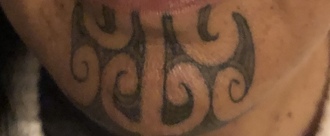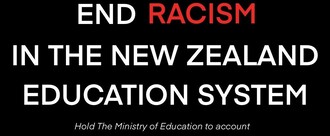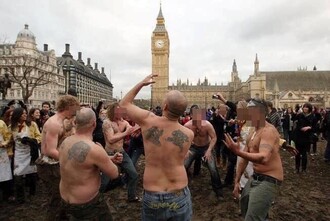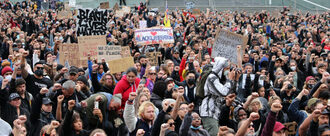-
Supporting paid leave for women after abortionsThe United Nations 2030 Agenda for Sustainable Development has a focus under Goal 5 on safe abortion as part of protecting “human rights and promoting gender equality and the empowerment of women and girls”. Target 5.6 seeks to ensure “universal access to sexual and reproductive health and reproductive rights as agreed in accordance with the Programme of Action of the International Conference on Population and Development and the Beijing Platform for Action and the outcome documents of their review conferences”. We believe that the Holiday Amendment Bill act could be changed to better suit the goals of the UN 2030 Agenda for Sustainable Development and to better support women in Aotearoa. We hope you consider our suggestion as young people and women going into the workforce. As a society, we believe we need to do more to ensure women have equal rights and have equitable working conditions. Thank you for helping us in our fight to remove the word ‘unplanned’ from Ginny Anderson’s Holiday Amendment Bill. Ngā mihi, Lorna Hallett Renee Hamilton Kate Chu Athena Kapralos Ella Murdoch Evie Harrington Bella Redshaw Bintou Fiti-Jaiteh Natasha Taylor Valora Leilua-Tiatia Tia-Rhiena Martin-Upton Nicole Askari Ruby McGovern Sophie Irving185 of 200 SignaturesCreated by Lorna Hallett
-
Support families in need. Extend the Winter Energy PaymentAs New Zealanders, we believe in justice and compassion. We want everyone to have the opportunity to thrive. But, right now, hundreds of thousands of people in our country are living in poverty. Despite our differences, we share a responsibility to make sure everyone has a decent standard of living and the same chances in life. Poverty in New Zealand affects people of all ages and situations – children and their parents, young adults, people in and out of work and people with disabilities. The stress that comes with poverty can erode people’s mental and physical health. Showing compassion as a society means making sure no-one has to endure the harms of poverty. On October 1, 2020, the Winter Energy Payment that is provided to people on government income support, to assist with heating a home, is due to expire. This will cut the already low incomes for people locked in poverty by $63 a week for couples and $41 a week for an individual. But as research has shown, $40 - $60 less per week means not being able to go to the dentist or doctor, not being able to afford emergency bills and not being able to pay for kids to participate in extracurricular activities like sports, art or volunteering. At a time where food banks are reporting record demand and the number of people needing government income support had its biggest jump in 24 years in April, the government needs to show some compassion. By permanently extending the Winter Energy Payment, the government can help make it possible for everyone to do well.858 of 1,000 SignaturesCreated by Nick Stoneman
-
Recognise the rights of mokoMoko, a divine treasure etched into the skin to enhance the cultural identity of Māori in New Zealand. Moko, beautiful markings reflecting the whakapapa (geneology), history and mana of the wearer. Moko, an important traditional practice used by Maori since time immemorial. Please support this petition to include 'moko','moko kauae','mataora', 'ta moko' as prohibited grounds for discrimination. History tells us our tipuna enjoyed freedom of movement as moko wearers, a legacy we should able be able to carry on as well.8,562 of 9,000 SignaturesCreated by Rangimiria Ihakara
-
Youth Justice Demerit Points Bill Fails Young People: Ask the Select Committee to reject it!To the Social Services and Community Committee We ask that you reject the Oranga Tamariki (Youth Justice Demerit Points) Amendment Bill. This Bill, though well intentioned, fails to understand and respond to the complex and layered challenges facing our rangatahi. At the heart of this bill lies a lack of understanding of the drivers behind youth offending, and the sort of interventions needed to support rangatahi to thrive. According to the Youth Offenders summary report in 2019, of those referred to a FGC, 94% of kids 11-13, and 81% of young people aged 14-17 had been the subject of a report of concern to Oranga Tamariki relating to their care and protection. This data highlighted "that young people who offend often have complex problems, which can be among the underlying causes of their offending." If you speak with Youth Development Workers, or Social Workers supporting these rangatahi and whanau, they will testify to the reality that a large proportion of rangatahi who end up reoffending are often victims of abuse, with a history of poverty, mental illness, housing instability, intellectual disability, and severe trauma. They are also predominantly Maori, facing regular, and constant discrimination. The Youth Justice Demerit Points bill fails to provide an answer to these very real and significant issues that lie at the root of youth offending. Another failure of the Bill is its assumption that our inability to support rangatahi early enough is a failure of identification. However, if you once again were to speak to Youth Development Workers, Social Workers, and other community workers who are serving and supporting our whānau and rangatahi, they will tell you that identifying rangatahi at risk of reoffending is not the problem. Our communities know who these young people are. The issue lies in the lack of resources and supports available for young people within our community. The idea of using demerit points to characterise young people, is also out of step with the Government's own Youth Development Strategy Aotearoa (YDSA). The YDSA commits the Government to thinking about, and walking alongside young people utilizing a Strength Based approach. The YDSA outlines that any additional support designed for young people "needs to be consistent with the youth development approach - that is, it needs to avoid defining the young person as 'the problem'." The Youth Justice Demerit Points Bill is out of step with the YDSA. It fails to approach our young people in a strength based manner, and it contributes to further stigmatizing and marginalizing young people. We are also concerned about the negative impact labeling our young people with Demerit Points will have on their overall mental and emotional well-being. Instead of passing a bill that will have very little direct impact on reducing the risk of a young person re-offending, we ask that Parliament turns its focus to: ★ Reviewing the Family Group Conferences (FGC) system: Audit the FGC system and provide the necessary resource and support needed to ensure that it is functioning in a manner consistent with the principals of Restorative Justice and Youth Development. ★ Focus on Early Intervention: Provide local communities with resourced and dedicated support so that they can meet the needs of the young people in their communities who are struggling and at-risk. ★ Develop a Strategy to address the Youth Homelessness crisis: We know that when young people experience homelessness they are more likely to offend as a matter of survival. A Youth Specific Homelessness Strategy would address the factors that lie at the root of youth offending. Child poverty, mental illness, disability, unstable and inadequate housing, trauma, discrimination and racism are all factors that would be addressed. Young people living in stable housing, with their mental, emotional, spiritual and physical well-being taken care of, are less likely to become involved in the Youth Justice System. ★ Provide each young person entering the Justice System with a trained Youth Development Worker: A service designed in consultation with the Youth Development Sector, with a specific focus on supporting rangatahi who enter the Youth Justice system, would be one way to provide early intervention to rangatahi as soon as they enter the system. If each rangatahi had a dedicated Youth Development Worker, their needs could be assessed immediately, and they would than be able to be connected to the right supports before they become entrapped within the system. The Oranga Tamariki (Youth Justice Demerit Points) Amendment Bill fails to understand or acknowledge the driving factors behind youth offending, and thus it fails to adequately respond. For this reason, the Bill should fail. You can read more about our concerns with the Bill here: https://whenlambsaresilent.wordpress.com/2020/07/30/will-demerit-points-stop-youth-offending-a-j-hendry/ You can find the bill here: http://www.legislation.govt.nz/bill/member/2020/0229/latest/whole.html#LMS323852409 of 500 SignaturesCreated by Aaron Hendry
-
End Systemic Racism in New Zealand SchoolsThe education system's purpose should be to nurture and support children, unfortunately this is not the case. Not all children are treated equally in our current system. Countless children have experienced racial abuse in the New Zealand education system, this disturbing problem has persisted for decades with little to no improvement. The effects of racial abuse on children has been well documented in academic literature. The Ministry of Education has been negligent in their response to the problem and have failed to protect vulnerable children from racial abuse. https://www.renews.co.nz/endless-stories-of-racism-in-nz-schools/ Testimonies of racial abuse victims will be included with this petition. Testimonies of racial abuse can be emailed to [email protected] or @ngati_frybread on Instagram. If you sign this petition please also consider to writing your local MP with your thoughts on this kaupapa. https://www.parliament.nz/en/mps-and-electorates/members-of-parliament/ We can make change, ngā mihi!4,962 of 5,000 SignaturesCreated by Ngati Frybread
-
Remove 'Waitangi Day' from the Waitangi Day Circle Line Pub Crawl event name & cancel the drunk HakaThis is important because the inclusion of Waitangi Day in the pub crawl title enables and perpetuates the dishonouring of Te Tiriti o Waitangi and is culturally insensitive. It also provides (and has done so on many accounts) an opportunity for intoxicated pub-crawl-goers to try to perform the Haka while wasted. The Pub Crawl (that has been going for 37 years) encourages New Zealanders in the UK to drink a lot of alcohol and 'celebrate' Waitangi Day by dressing up as 'kiwi icons' (eg. beer brands and marmite) and hop from one British Pub to another. As well as this, photographs have long-ago emerged of people trying to imitate traditional Māori Korowai, Tipare and drawn-on Moko Kauae poking out tongues and attempting pukana. Does this enhance mana? Does this contribute to British & European people seeing Haka performed incorrectly in London and therefore enables more terrible 'performances' of Ka Mate and Tika Tonu? Does the use of Waitangi Day by a non-Māori lead organisation and community respect the pain, loss and struggle Māori people have endured and still fight for when it comes to Te Tiriti and the reclamation of land, reo and culture? Related links: The Spinoff Article - There's something off about the Waitangi Day Pub Crawl by Madeleine Chapman https://thespinoff.co.nz/atea/06-02-2019/theres-something-off-about-the-london-waitangi-day-pub-crawl/ NZ Herald Article - Pleas for drunk Kiwis to abstain from haka during London Waitangi Day Pub Crawl by Michael Neilson https://www.nzherald.co.nz/nz/news/article.cfm?c_id=1&objectid=12305813 Te Ao Tapatahi Interview with Creator of Petition - Ashley Clark https://www.facebook.com/watch/?v=2957233182201501,419 of 2,000 SignaturesCreated by Ashley Clark
-
BLACK LIVES MATTERA black person is just human like everybody else. There is no reason for a black person to feel scared to approach somebody just because they are scared of how that person would react because of the colour of their skin. The story of George Floyd is just enough to explain this, a normal black man but suspected of a crime. He had allowed the officer to arrest him but the officer was still violating his rights while George begs him saying 'I can't breathe'. This whole situation resulted in George losing his life. George had no gun on hand but he was murdered purely because of the colour of his skin. Since January 1st, 2015, 1,252 black people have been shot and killed by police, according to the Washington Post's database tracking police shootings; that doesn't even include those who died in police custody or were killed using other methods. Often there is no need for the police to use weapons but it is just purely because the victims are black that the instinct of the police is to shoot. Every loss hurts it really does. We live in a colonised country here in Aotearoa, and that our solidarity includes standing against racism and I think it is time the silence is broken. Let us not forget things have fired up in America but this shows us what a lot of black people are facing around our world even in our very own backyard. We have taken on so much as black people and have had excessive patience but ENOUGH IS ENOUGH.531 of 600 SignaturesCreated by Kalkidan Yohannes
-
End Youth HomelessnessDuring Covid-19 young people experiencing homelessness have been at increased risk. There has been no coordinated, or youth specific strategy to provide for the needs of young people, and no housing made available to specifically meet their needs. We know that young people are over-represented in the homeless community, with young Maori, and rainbow youth, disproportionately affected. We know that there is limited safe, secure and suitable accommodation for young people experiencing homelessness. We know that - due to limited resources - Youth Housing services are having to turn hundreds of young people away. Yet, our nation has no youth specific strategy - and has provided limited resources - to meet the needs of some of the most vulnerable members of our community. If you are a young person, and you experience homelessness in New Zealand, your options for finding emergency accommodation are low. If you're 16-17yr's old, your chances get even bleaker. With the gains made during COVID19 for our homeless community we have an opportunity as a nation to end rough sleeping in Aotearoa for ever. However, to end homelessness, we must first End Youth Homelessness. To do this, we need your help. Manaaki Rangatahi call on Aotearoa, and the NZ Government, to join with us to #EndYouthHomelessness. Will you sign the petition and support the call and help us to #EndYouthHomelessness? You can read more about Youth Homelessness here: Youth Homelessness is Hidden Homelessness: https://www.stuff.co.nz/national/116095068/the-hidden-homeless-alarming-child-and-youth-homelessness-in-auckland If we truly want to end homelessness, we need to start here: https://www.noted.co.nz/currently/currently-social-issues/nz-ending-homelessness-starts-with-helping-young-people7,809 of 8,000 SignaturesCreated by Aaron Hendry
-
School Strike 4 Climate NZ & 4 Tha Kulture Open Letter Calls For Covid Green ResponseAs the youth of Aotearoa, it is important that the decision and projects that we put forward work around securing our generation a safe future. The children of New Zealand will be paying off the debt collected from the stimulus project. We demand that you, as the leaders of today, ensure us a safe future923 of 1,000 SignaturesCreated by School Strike 4 Climate NZ

-
Abolish interest during mortgage holidays while the Covid-19 crisis occursBanks have only offered the same mortgage holiday terms applicable in ordinary circumstances (pre-pandemic). While other businesses are pulling out all stops to help and may not survive, banks are effectively doing nothing. We have been told that the recession arising out of this crisis will be far worse than the GFC, therefore the measures put in place need to be stronger. Many people are in greatly reduced circumstances due to lock down. Many have, or will, lose their jobs and may take some time to find a new one. In the short term this greatly affects young people with new mortgages, low income mortgage holders, and people who have had to re-finance recently due to unforeseen reasons. It also penalises people who have been paying diligently for some time, causing them to go backwards too. Landlords who hold mortgages over their properties may want to ease the pressure on their tenants finding rent, by decreasing their liabilities too. In the longer term adding interest increases household debt so people will have less spare cash to spend in the economy after the crisis, slowing recovery. Lack of money in society at this time can lead to increased social problems and crime. These are extraordinary times, we need extraordinary social measures. New Zealand banks are not following our Government’s and other NZ Business's good example, and we are well aware of the huge profits banks have been making in recent years. Your signature here will make a difference to the world we experience after this pandemic passes.58 of 100 SignaturesCreated by Miriam Isabelle
-
Protect First Responders: #SayNo to Revenge Based PolicyFirst responders are the people who are first on the scene of an emergency and do so sometimes at risk of harm to themselves. They need our complete support and protection from the risks involved in the essential work they do. However the proposed Protection for First Responders and Prison Officers Bill now going through Parliament fails to provide a solution to the issue which it seeks to address. The Bill if passed will create a new offence – injuring a first responder or prison officer with intent to injure – and carry a mandatory minimum sentence of six months’ imprisonment. This will not prevent any assaults on First Responders or Prison Officers. Policies based on ideas of punishment and revenge do not help to reduce violent crime or protect our First Responders. Many people who commit these kinds of crimes are not safe, stable, or in a sound mind at the time that the crime occurs and are the people who need support themselves. Many of the people this Bill would affect if made law would be people suffering from extreme trauma, addiction, mental illness and mental distress. The Bill would send people who themselves need help into the court system and increase Aotearoa’s already too-high prison numbers. This bill fails to recognize that many of the people who will be affected by this bill are not in a rational or calm state of mind during the time these assaults occur. People who could be severely distressed, mentally ill, intoxicated, or any combination of the above at the time the offence occurs. If this bill goes through it will have catastrophic consequences for our communities. We know that the justice system disproportionately causes harm to Māori.[ref] This bill, if it goes through, will continue to work within this racist system sending more Māori through the justice system rather than the health system. When you send one of our whanau to jail, it does not just affect the individual. It harms all of us. The children left behind without parents, the partners left alone to manage on their own, the whanau and friends who have to struggle with the stigma and loss of losing someone they love. If the Government is serious about keeping First Responders and Prison Officers safe, it needs to address the root causes. We believe Parliament would be better served using our time and resources seeking real solutions. For example: ★ Focus on prevention (as outlined above). ★ Review the calibre and frequency of de-escalation and assessment training provided to First Responders and Prison Officers. ★ Provide ongoing de-escalation and assessment training to all professionals working on the front line. ★ Provide intensive training for all first responders and prison officers around addiction, mental illness, and the effects of trauma and colonisation. ★ Bring back the previous government's plan to create a mental health team equipped to support the Police and our First Responders in de-escalating and caring for people in crisis and suffering from mental distress. This is now being trialed in Wellington. ★ Review whether First Responders and Prison Officers have the right support to manage these high and complex situations they are being asked to walk into. Are they staffed adequately to deal with these situations? Do they have adequate safety and support plans in place to mitigate the risks they are dealing with? If not, the Government must fully resource these services, providing them with what they need to do the job safely. To protect our First Responders and Prison Officers we must provide solutions that prevent them from being harmed in the first place. A serious commitment to our First Responders safety would address the impacts of colonisation and generational trauma, would look at ending poverty, increase support for our under resourced mental health and addiction services, and would fast track the reform of our current Justice system in order to ensure that it heals victims, and restores those who perpetrate crime back to healing and wholeness. In January we made a submission to the Justice Select Committee to make these recommendations, and we thank you for your support so far. However the Bill will still go forward to its Second Reading, and Parliament will get another chance to vote on it. If you want our politicians to #SayNo and #EndRevengeBasedJustice, then please sign. Your signature will be delivered together with others as a petition to Andrew Little, the Minister of Justice, prior to the Second Reading of this bill If you would like to read more about this bill you can do so here: Revenge Based Justice Wont Keep First Responders Safe, Noted, 23 Jan 2020 https://www.noted.co.nz/currently/currently-crime/revenge-justice-wont-keep-new-zealands-first-responders-safe Law change not necessary to protect first responders, NZ Law Society, 9 March 2020 https://www.lawsociety.org.nz/news-and-communications/news/law-change-not-necessary-to-protect-first-responders,-says-law-society171 of 200 SignaturesCreated by Aaron Hendry
-
Let Martine Abel-Williamson Stand for President of the World Blind UnionI hope you will agree it is completely unacceptable for the Board of Blind Low Vision NZ, as a public charity and New Zealand's primary provider of blindness services, to hide from scrutiny and take such a defiant, unilateral, and provocative action against a high profile blind New Zealander, without a word of explanation. The Board's actions are so hard to explain that some are asking what on earth is really going on. One director, Clive Lansink, has openly stood up to say that he is embarrassed by this decision. He has said that he did support Martine's nomination, and he knows of no genuine reason why the Board of Blind Low vision NZ has chosen to block her aspiration to stand as President of WBU. They have agreed to support her to stand again as Treasurer, so cost cannot be the reason. We and many others believe that a decision like this must be open and transparent and should fully take into account the clearly stated wishes of Blind Citizens NZ as Blind Low Vision NZ's DPO partner. We're here to support Martine and we hope you are also. But at the same time, we hope you agree that the Board of a public charity like Blind Low Vision NZ should not behave like this. Please join us in calling for the Board of Blind Low Vision NZ to come out of hiding and enthusiastically give its support to Martine as a passionate, hard-working, successful, blind New Zealander - the person that Blind Citizens NZ has nominated as its candidate for WBU President. Note: if signing this petition from overseas, please just enter 0000 when asked for your postcode. The following links may be useful if you want to quickly check more into Martine's background: Receiving qSM: https://www.scoop.co.nz/stories/GE1806/S00011/martine-abel-williamson-awarded-qsm.htm Attitude ACC Supreme Award: https://www.stuff.co.nz/national/108946777/martine-abelwilliamson-wins-attitude-award-for-changing-the-lives-of-people-living-with-disabilities World Blind Union global website: http://www.worldblindunion.org/English/Pages/default.aspx World Blind Union Asia Pacific website: http://wbuap.org357 of 400 SignaturesCreated by Mary Schnackenberg





.jpg)






